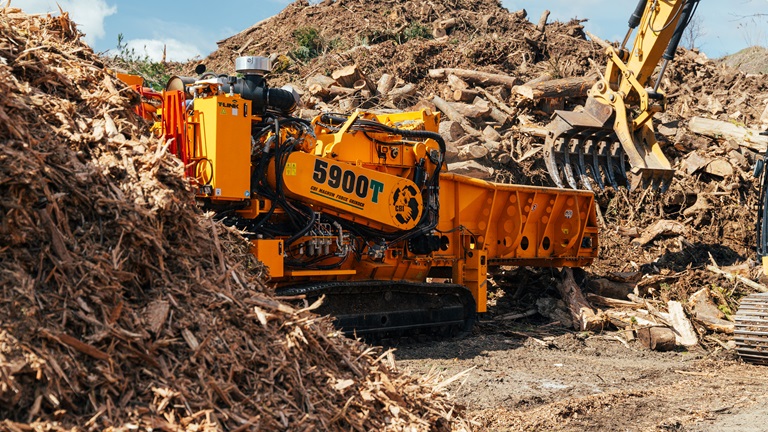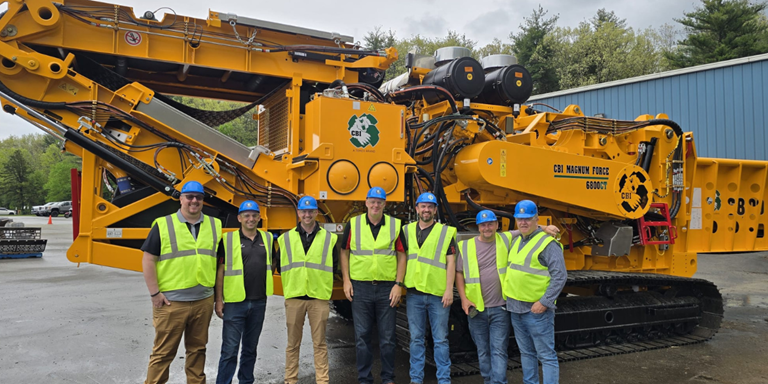NEWTON, NH — For over a quarter century, CBI has engineered biomass grinding, chipping and shredding equipment with a focus on long-term environmental sustainability. Biofuel, which is comprised entirely of organic materials, is processed through CBI equipment that is designed for profitable and eco-friendly biomass recovering and recycling duties. Various wood-based items serve as an excellent source of biofuel and CBI has designed its equipment to process this biomass application since 1988.
Despite biomass’s steady growth, CBI’s venture into the alternative fuel industry took place at a time when its potential wasn’t as well-known. Company founder Anders Ragnarsson originally came to America from his Swedish homeland expecting to operate a land clearing business but he soon realized that wood and waste wood cleared from site could be converted into profitable products such as mulch and biofuel.
“In the late 1980s, it was a new industry,” said Ragnarsson, CBI’s President/CEO. “The timing was right to design and build something that could do the job. People were trying to grind stumps in New England but every stump that came out of the ground was full of rock and dirt, so we had to make a grinder that could withstand that material to make a good product.”
CBI equipment is designed to keep biomass material out of landfills and in the hands of the manufacturers who transform it into biofuel. However, the needs for each of CBI’s biomass processing customers differ from region to region as applications vary. For example, wood pellet manufacturers originally resorted to sawdust as a biomass resource but turned to whole tree chips when availability for sawdust grew scarce. The processing of wood chips was deemed expensive and energy-consuming, which led to CBI designing 4-pocket industrial chippers that yield uniform micro-chips. Once processed through the chipper, the micro-chips are immediately dried and milled into feed stock for the pellet press. The material no longer requires hammermill processing before entering the dryer, which saves up to 75% of the input power requirement.
Wood pellets serve as a clean and convenient source for economical heating, whether it’s on an industrial or household level. Compared to heating oil and natural gas, this medium provides consumers with a market price that is more stable. Rentech, a major processor of natural resources including wood chips, wood pellets and natural gas, utilizes CBI equipment for its two Canadian biomass plants in Wawa and Atikokan (both locations are within the Ontario province). Teamed with CBI, Rentech is now able to continue its pellet processing and sustainable practices at an efficient rate of 120+ tons/hr.
“Traditionally, debarking and chipping in front of a pellet operation has been done with drum debarkers and disc chippers,” said Ragnarsson. “These systems are overall more expensive and have a tougher time debarking frozen wood. It has been proven beyond any doubt over the last several years that making microchips is a more cost effective way to produce raw material for a pellet production line.”
CBI backs up its eco-first mission by minimizing the carbon footprint of its Newton, New Hampshire headquarters. A wood-fired boiler installed in 2008 has given CBI an in-house solution for heating its entire 64,000 square-foot facility. The boiler is fueled with processed wood chips that are sourced from the company’s on-site machine demonstrations and testing. In 2014, 526 tons of processed wood chips were fed into the boiler, which drastically lowered heating costs despite CBI’s frigid New England location.
“We virtually pay nothing for heat,” said Harry Smith, a service specialist for CBI who also helped install the boiler system. “Because the chips entering the system are produced by our machines, we know that there will be no issues in it receiving high-quality fuel chips for a smoother and consistent operation.”





